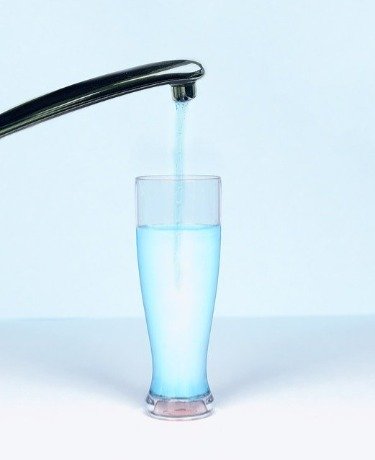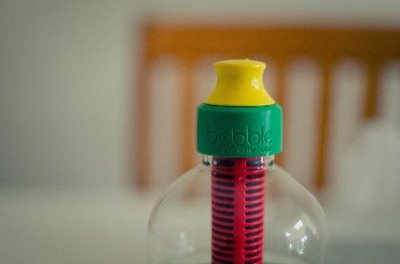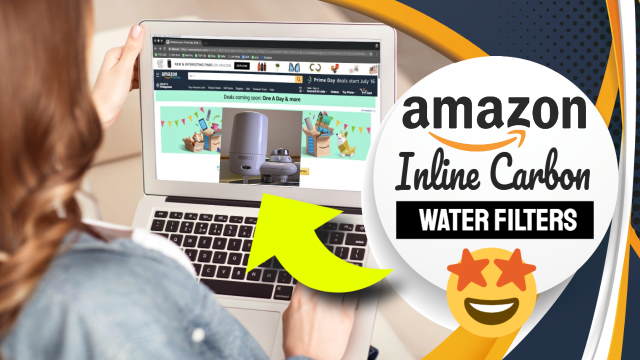Many people use inline carbon Water filters for their faucet water supplies and refrigerator ice, so we set about to create this honest article about the subject, to explain in detail, and dispel some myths about carbon water filters.
What Are Carbon Water Filters?
An activated carbon water filter is a filter that uses activated carbon as the filter medium and removes a whole host of impurities.

The impurities are held on the carbon molecules. Free chlorine, phenols, organic solvents, and pesticides are examples of the substances these filters remove from the water.
Recently, the applicable area for the use of carbon filtration has widened into various industries such as breweries, waterworks and wastewater treatment.
It plays a crucial part in the process of cleaning up tap water to make it more palatable but also has vital uses when needed in removing pesticides in drinking water.
The product range for domestic use is extensive and comprises filters of many different sizes and materials as per the requirement of our clients. Some manufacturers offer carbon water filters made in stainless steel containers with CIP (Cleaning In Place) for disinfection.
Check Current PricesLong-Lasting Inline Refrigerator Water Filters
The Eco-Pure Epinl30 is an example of one of the most long-lasting inline water filters in the market. in common with other makes featuring a universal design, it connects easily with most of the top brands of ice makers and refrigerators, These include Samsung, Whirlpool, LG, GE, and Kenmore. RV inline water filters ensure that the filtered water will be pure, clean, and healthy for daily use. These are also amazing inline water filters for the icemaker, producing clear ice at your home, camper, or boat. This chlorine filter protects your water from sediments and unpleasant odor and taste.
Faucet Water Filters Are Useful But Don't Be Frightened By These Myths About Tap Water
The vast majority of tap water supplied to homes and businesses throughout the developed nations, and indeed within the developing nations is of high quality and substantially free from risk if you drink it. If it isn't the water supply companies will inform you that the water should be boiled before use, and in most cases, this only occurs during emergencies.
A quick browsing session brought up the following myths:
“Did you know that there is about the same amount of chlorine in your tap water than there is in the local swimming pool?”
Not true. You would smell it and taste it and water regulators do not permit this.
“Public tap water also has been found to contain hard* metals, pesticides, building wastes, prescription drugs and VOCs (volatile organic compounds.)”

This one is true but it's a myth to infer that it's anything to be worried about in your drinking water. The water supply company is responsible for ensuring that none of these substances is ever-present in concentrations that could do any harm. (* We assume they mean “heavy” metals, because there is no such scientific classification of metals as “hard” and “hard metals” means nothing at all!)
“Chlorine – originally used to kill microorganisms and bug eggs in water – has unfortunately occurred in many municipal water supplies in high concentrations.”
That's another myth. Occurrences are rare and remedied quickly if they occur
“Public tap water is in such poor shape mostly due to pollution. Even your front lawn is part of the reason, because lawns have very shallow root systems.”
This is another myth. Public water supplies do not come from under people's lawns. Nor do “shallow root systems” have anything to do with faucet supplies.
We are not knocking the use of carbon water filters for improving the taste and reducing already safe low residual chlorine levels in the water from domestic faucets, but please do not become worried by the myth makers!
Check Current PricesWhole House Under Sink Water Filters and other Means to Filter Water
Some under-sink water filters require you to install a dedicated faucet to dispense the filtered water. These models are a bit harder to install, and some are designed to filter all the water to the whole house. If you want the cleanest possible water, this is the way to go. But, you would have to be either very wealthy and very willing to waste your money on a fad, or a bit of a crank and full of unnecessary fears, to really think this was necessary.
Apart from faucet water use, these have become popular for aquarium use. Through the addition of improved pumped models, these filters have gained a lot of popularity. The principle is quite simple: by using a pump, the water is forced to pass through the filtering masses inside the filter container and then returned to the aquarium. The aquarium style filter is generally fixed by means of suction cups to the inside walls of the tank. Some of them simply pass the water through a foam offering only mechanical filtration, while others have one or more compartments to allow the aquarist to put the filtration materials of his choice, such as activated carbon as a filter.
Whole house water filters are also available, some of these are housed under the main sink in the house, close to the water supply inlet. Websites like Amazon allow you to choose from over 100 whole house water filters. Some of the industry’s top brands include tier1, Pentek, Rusco, Culligan and more.
Whole house water filter systems are placed on the main water line entering your home and designed to remove rust, sediment, chlorine and other chemical contaminants from all water entering your home. So no matter where you are in your house, whether it’s the guest bedroom shower, outside hose, kitchen or bathroom sink, you and your family can have clean, healthy and great tasting water.
Not only does a whole house water filter give you the luxury of clean great tasting water from every faucet in the house it can also help extend the life of appliances that use water, such as dishwashers, water heaters, and washing machines because it removes the sediment, chlorine and other contaminants that would otherwise be entering those appliances.
Check Current PricesActivated Carbon Filters 101
Carbon filtration is the method used inside most refrigerators with built-in water and ice dispensers. Carbon filtration involves the use of activated charcoal and is commonly in water filter pitchers as well as air purification products. The activated charcoal filters water through adsorption, a process where molecules, atoms, or ions adhere to a surface. There are tiny holes in the media that trap certain things while letting H2O pass through. Those holes are different sizes and so can trap many different substances.
Commercial and industrial Activated Carbon Filters, in these, granular activated carbon (GAC) is used for the reduction of taste, odor, and dissolved organic material from municipal and industrial water supplies. The most common application is the removal of free chlorine from water supplies or as pre-treatment to other water treatment systems such as reverse osmosis. Inlet water to activated carbon systems should be relatively free of turbidity and iron for optimal performance. Numerous types of activated carbon are available for speciality applications.
In “activated carbon”, the carbon is activated by heat or steam. The activation process opens the pores of a carbon filter, increasing the surface area and giving the carbon more capacity to hold contaminants. For this reason, all the carbon filters the best manufacturers supply are made from activated carbon in the form of granular activated carbon (GAC), carbon block, or radial carbon filters.
Types of Carbon Filters?
The choice of the type of carbon filter is yours, more sediment filtration, double the carbon filtration, add iron reduction. You pick the number of stages and the corresponding number of filters and we'll build it for you with pressure performance, says one supplier. The main purpose of a whole house water filter is to deliver clean, clear water to every water faucet and shower head in your home without drawing down water pressure. Beware of the low-cost systems because some may use undersized housings with small ports. They risk restricting home water flows and reduce performance so that shower pressure may become weak and the showering experience unpleasant as a result.
Standard size large carbon water filters are close to 10″ in length and 4 1/2 inches in diameter. They fit in 10″ big blue water filter housings and are used to reduce chlorine, taste and odor and other contaminants from your water.
All types of carbon filters have one thing in common. They need regular replacement of the spent carbon filter medium (Activated Carbon). As they remove pollutants, they become clogged up at a micro-scale and once they reach a certain point the rate of removal of the pollutants tails off. At that point, and not after, it is essential to change the filter carbon.
Check Current PricesWhat is Activated Carbon And How Does It Filter Water?
Activated carbon is simply a natural form of carbon which is treated by heat or chemically to maximise the amount of molecular surface on which pollutants can be adsorbed. It is simply by holding the pollutant which is contaminating the water on the surface, that it takes it out of the water flow. The unwanted substance is still there in the filter all the time, it is not changed into a new substance by the activated carbon.
The filtration process consists of running the water through a granulated activated carbon chlorine filter, which contains activated charcoal, which traps the chlorine molecules. The carbon in the charcoal absorbs the chlorine molecules, making it easy to remove traces of chlorine. Kinetic degradation fluxion, another form of filtration, is also used to filter out chlorine from water.
The in some filters the process may also include a copper-zinc alloy to convert free chlorine into chloride through the process of oxidization. The process is followed by other steps to remove chlorine entirely.
Some water bottles can be bought with an AC filter. For example, the Bobble Sport Water Bottle features a carbon filter that purifies your drinking water as it passes through the spout. The replaceable filter is effective for up to 300 uses. The manufacturer points out the for most people that is ample for a full year of workouts.
The filter removes chlorine and contaminants from tap water to give the water a cleaner, crisper taste. Every fitness fan knows that buying bottles of mineral water can get expensive, so your gym buddy probably already has a reusable water bottle. Alternatively, you can fill your bottle with filtered water at home and then go to the gym with it. But what happens when if you drink too much and finish it off? The bobble sport water bottle with its built-in filter will help ensure that every bottle of water you drink is filtered water, for the best in health and taste.
The Ecosoft Countertop water filter system employs a coconut shell based carbon filter which is very efficient at organic chemical adsorption. And that is the biggest selling point of this unit. The countertop drinking water filter is said to be budget-friendly and efficient in removing what anything harmful, if there was any to start with, in your drinking water. Its efficacy goes as far as removing contaminants such as lead and chlorine that sometimes characterize tap water. But, please be aware that unless you live in a banana republic undergoing a revolution, you can really and truly trust tap water these days. Speaking of taste, there is a point to these filters there. A good water filter with fresh carbon media installed will blow your mind with its refreshing feel.
Check Current PricesAre Carbon Water Filters Safe?
Carbon filters are not intended to make it safe to drink if the water is a risk to your health on the way into the filter, don't automatically assume you will be safe just because you have a carbon filter installed. You might be surprised to learn that the main function of popular refrigerator and pitcher filters is to improve the taste of your water not to make it safe to drink.
A basic activated carbon filter isn’t capable of fully protecting you against germs and some other contaminants. When the carbon in it is fresh it will reduce most things which form impurities in water. But, no germs or anything else for that matter is destroyed by the activated carbon.
AC filters are certainly of benefit to people who do not like the taste of their tap water. Sometimes this is because of the disinfectant (like chlorine) that helps keep the water safe from germs. Sometimes minerals or other naturally occurring contaminants like sulfur-containing compounds that are not harmful change the taste of the water. Activated carbon filters (the type of filter found in many refrigerators and pitcher filters) can help reduce unpleasant tastes and odors.
Reverse Osmosis (RO) systems are different and they have a molecular scale filter membrane, and they are completely different in the way they work. RO systems can also improve taste and also reduce the levels of common chemicals such as lead. Check the label to ensure that taste and odor are addressed by the particular filter you are considering. Keep in mind that if you use a chlorine-removing whole-house filter, you might end up increasing the number of germs that grow elsewhere in your plumbing.
When people say things like the following, they are usually speaking about isolated locations and incidents:
“Our water supply system is seriously overloaded with chlorine, bacteria, fluoride, pharmaceuticals and other toxic substances. It is in fact a hazard to our health. Most of us are aware of this now whether it is from advertising, word of mouth or simply by the fact that our water tastes, looks and smells bad. Water filters have become a necessity in our homes.”
There are several ways that water filters work. Some filters will combine different technologies while others will rely solely on one key technology. But, they have one thing which is the same about them, and that's the fact that if you neglect to change the filter media they will do you no good. Once the media is all spent and the capacity to hold the nasties in the water is used up, just like a battery, they must be changed for new media regularly. Just as a battery can cause damage if left in a device after it has discharged, so can carbon filter media allow germs and all things past if not maintained fastidiously.
But, having said that, most people love their water filters. Here are some testimonials we couldn't help noticing and which we want to tell you about:
“What an amazing product. I love my new water filter. The water is soooo clear, pure and taste great. I highly recommend this water filter to anyone who is looking for a top quality product at a reasonable price. Thank you.
Blair S., Detroit.
“This filter improves the taste of our city water tremendously and we have no worries that we are drinking safe, clean, refreshing water!”
Tamilar.
And, finally:
Check Current Prices“… reliable and very easy to install. I have used these filters for a very long time with complete satisfaction.”
What Do AC Filters Remove?
Excellent for use in dechlorinating water and removing many tastes. It is also said that they remove chloramines, but normally only with a catalytic carbon upgrade. These are rumoured to give a much longer life and higher flow rates than carbon filter cartridges. Activated carbon filters don't produce wastewater. Therefore, no backwash system is needed.
Non-electric, easy to install. No maintenance required. Carbon media lasts for years. NSF certified, one-piece, seamless poly filter tank for long life. High activity granular activated carbon is manufactured by steam activation from select coconut shell charcoal. Removes low molecular weight organic compounds and their chlorinated by-products such as chloroform and other trihalomethanes (THM's).
This article will provide an explanation of the activated carbon block water filter, including how it works and choosing among options for specific ones. In the process of filtering water, activated carbon is often used to remove contaminants and impurities. Carbon is probably the most absorbent material known to man, and it is uniquely efficient because of thousands of tiny pores that can absorb. For example, a pound of activated carbon provides 125 acres of filtering surface area. The carbon is positively charged to attract negatively charged impurities such as chlorine, chemicals and volatile organic compounds.
Then you’ll appreciate the clever design and super speedy installation process of this 3-stage under counter water filter. The system is fitted with three filters that remove up to 77 different impurities from your well water and municipal water supply. How does it work? the filter comes with a granulated active carbon fluoride filter that removes fluoride, VOC, pesticides, and other additives present in the water. Then the water passes through a catalytic carbon that deals with chlorine impurities. Lastly, the water is cleaned with an ion-exchange process that handles heavy metals like lead and mercury. Adding to this is the micromechanical filters that trap bacteria, cysts, and other germs.
Alternatives to Carbon Water Filters
A series of popular whole house carbon filters designed to remove chlorine, chloramine, chlorine disinfection by-products (trihalomethanes – THMs), general bad tastes and odors, volatile organic compounds, and a wide range of other common water contaminants. This is only needed for poor quality water supplies, usually in connection with private wells or at direct river extraction points. The best whole house carbon filter packages also include a high-quality sediment pre-filter to remove dirt, sediment, rust particles, and other particulates thereby improving water clarity, taste, and odor.
When the water supply is so low, water quality filtration helps protect any home's plumbing system (including your carbon filter and other water treatment equipment) from damage and pre-mature clogging due to sediment build-up.
One of the most popular types of home water filtration, carbon filters are very effective and give you multiple options for use. If your family are not “water hogs,” a simple special canister fitted with a carbon filter may be sufficient. The principle of chemical absorption removes contaminants and impurities from tap water using activated carbon filters. Just a pound of activated carbon offers a surface area of around 100 acres; therefore, this form of carbon is extremely efficient as a filter. Active charcoal carbon filters will remove chlorine, odors, sediment, other volatile organic compounds, and improve the taste of water. However, carbon will not remove minerals and salts from filtered water.
If you’re looking for a holistic water softener then a company called “Home Master” claims to have got you covered. The company has crafted a house water filtration system that it says combats all hard water impurities. The multifaceted system contains both carbon and sediment filters to achieve this feat. The idea is that the system will remove traces of sediment and other known minerals from the water supply. It also cleans out the rust and limescale buildup that can be affecting plumbing lines. A clean and hygienic supply of water is claimed to be the result of using that system.
Carbon Filters And Do They Eliminate Contaminants From The Water?

Why else do you need the unit is it is not to eliminate contaminants from the water? As such, look at the unit carefully and check if it can reduce the most common types of water contaminants. Pay special attention to the unit’s efficiency in eliminating chlorine, fluoride, lead, organic compounds, heavy metals, and pesticides. Check also if it contains carbon filters to eliminate smells from the water. Usually, the best units for handling almost all contaminants feature a multi-stage filtration system. Take note that they are more expensive, however.
Carbon block filters have a much larger surface area, which allows them to filter out a much larger quantity of water while also being much more effective at filtering out particles, heavy metals and other contaminants. Now, this isn’t to say that granular activated carbon filters are necessarily a bad choice, but it does mean that you need to be fully aware of the differences between these two types of filters in order to make a more informed decision. For this reason, we will now present a quick overview of both granular activated carbon and carbon block filters to make it easier for you to decide which is a better fit for your needs.
These are also known as carbon filters or pre-filters and are generally responsible for removing larger particles like sediment and silt from your water. They work by attracting and absorbing these particles so they’re no longer present in the liquid that comes out of your faucet. An activated carbon filter will also make sure the end result has less in the way of odor and tastes much better. This is because they reduce the amount of chlorine and other contaminants that can make your water smelly or just darn right unpleasant to drink.
Check Current PricesCheck this article to learn how to purify water using carbon: There are many cases that cause water contamination. Health problems related to unclean drinking water has always been a problem. Water at home can be purified with iron or chlorine filters. It is to purify water using activated carbon.
Give your family clean drinking water using a water filter. A carbon water filter is now probably the most common water filtering mechanism that is widely used in many households all over the world. Water is the number one thing that people and other living things need. Hence, it should not only be readily available but must also be safe and healthy especially for human consumption.




